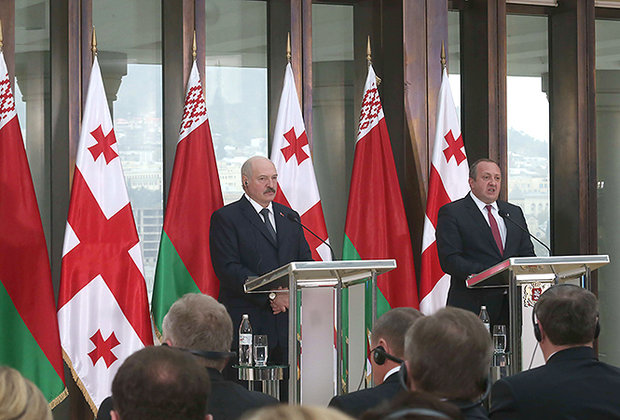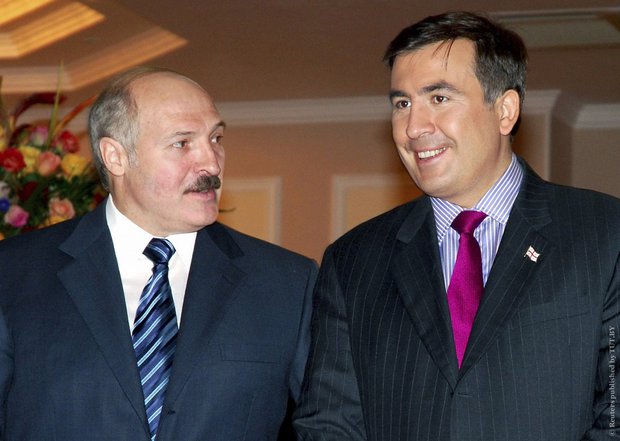Will Lukashenka Mediate A Russian-Georgian Rapprochement?

Photo: tut.by
On 22-24 April Aliaksandr Lukashenka paid his first official visit to Georgia in the history of his reign. Belarus and Georgia have maintained minimal economic and political ties over the years, mainly due to Russia’s confrontation with Georgia that has continued to develop over the past decade.
However, Belarus has refused to support the Russian-backed breakaway republics of Abkhazia and South Ossetia, for which it received a lot of support from Georgia in the international arena. Instead, Minsk seeks to counterbalance Russia's influence on post-Soviet integration projects, and an alliance of smaller states could make their voices stronger in talks with Kremlin.
At the same time, Lukashenka’s rhetoric is pushing for a reconciliation between Russia and Georgia, which could enhance his positions both in Moscow and in the West.
Lukashenka’s First Visit to Georgia Ever
Lukashenka’s visit to Georgia was truly a historic event, as it was the first visit of Belarusian leader to Georgia after the USSR's collapse. Lukashenka met the President and Prime Minister of Georgia, the Patriarch of Georgian Orthodox Church, the leader of the autonomous republic of Ajaria and other senior officials. Several Belarusian Ministers accompanied Lukashenka and were behind him as they signed a number of agreements for industry, agriculture and internal affairs.
So far Belarus has had little economic cooperation with Georgia, and bilateral trade has accounted for only $62m in trade in 2014. With Lithuania, a country of a similar size as Georgia, Belarus has a trade turnover of $1.5bn, a far more substantial amount. There is not even a Belarusian embassy in Georgia, though the Georgian embassy in Minsk has been working since 2007.

Upon his arrival in Tbilisi, Lukashenka has vocally emphasised Georgia’s role in backing Belarus internationally: “We have no issues politically. I am grateful to your former and present presidents for your support towards Belarus in the West”.
Lukashenka has also stated that Belarus supports the territorial integrity of Georgia as recognised by international treaties. He promised that a Belarusian embassy will appear in Tbilisi within a year’s time.
Lukashenka has also stressed that improving relations between Georgia and Russia remains an important issue: “I think that soon we will understand how to not only overcome this unfriendly rhetoric, but to reconcile the views of our countries and live as one big family as we did before”, Lukashenka stated.
Ups and Downs of a Distant Friendship
Belarus has never seen Georgia as a foreign policy priority, neither in political nor economic terms. In 2004 the Belarusian authorities viewed the new president of Georgia Mikheil Saakashvili cautiously after he came to power as a result of the Rose Revolution. At that time, ahead of the 2006 presidential elections, the Belarusian leadership was afraid of having a colour revolution break out at home, as one country after another rid themselves of their Soviet-era leadership.
However, after the elections, as Lukashenka ensured his continued rule, and during the start of the Russian-Georgian tensions, the relations between the two countries began to improve. For one, Belarus refused to support Russia’s initiative like a ban on Georgian wine and mineral water, and even attempted to smuggle it into Russia.

Furthermore, following the 2008 Russian-Georgian war, Belarus refused to recognise the self-proclaimed independent republics of South Ossetia and Abkhazia, both backed by Russia, which led to a bit of discontent in the Kremlin and garnered acclaim in the West.
The Russian media has since repeatedly attacked Lukashenka for his position on the issue, an onslaught which they further responded to with purely pragmatic calculations – the Kremlin would not reimburse Belarus’ losses from possible sanctions by the West in case of their recognition.
Belarus's position on the topic made Georgian leaders very happy and led to a lobby of active support for Belarus on the international level regardless of its undemocratic record. Lukashenka and Saakashvili met personally several times and seemed to have had very friendly ties. According to Wikileaks, Saakashvili unofficially invited Lukashenka to visit Georgia, but he said he would not dare to anger Russia by doing so.
Russian Envoy or Talented International Player?
The main question behind Lukashenka’s visit was its rationale – whether he came to Georgia as the president of an independent country or as Russia and the Eurasian Union’s envoy. Most Georgian experts think that Lukashenka came at the request of Putin, while also trying to capitalise on the role of being a mediator’s, as he has successfully done recently hosting European leaders at Minsk talks over Ukraine crisis.
One observer opined that Lukashenka came with a message from Putin Read more
The Director of the Georgian Foundation for Strategic and International Studies Kakha Gogolashvili in a comment for Deutsche Welle opined that Lukashenka came with a message from Putin, as this visit could not have happened without the Kremlin’s permission. The development of Belarusian-Georgian relations was not Lukashenka’s key objective, or so many experts believe.
However, Andrej Kazakievič, director of the Minsk-based ‘Political Sphere’ Institute, in a comment to Belarus Digest doubted that Putin played any role in Lukashenka’s visit. This move by the Belarusian leadership is rather logical in the context of pushing for a general improvement of relations with the West and pursuing a more balanced foreign policy.
Belarus is attempting to counterbalance Russian dominance in post-Soviet projects like the Eurasian Economic Union and the CIS, and therefore seeks out alliances with other small states. The economic background of the visit is also important, despite the current insignificant trade figures, as particular sectors of the Belarusian economy can benefit from expanding in to the Georgian market.
Clearly, Moscow is interested in engaging Georgia in the post-Soviet projects of Russia and helping to disway it from its EU and NATO aspirations, which Georgia have been consistently demonstrating. Meanwhile, Georgia realises that the west will not offer its military assistance in case of Russian intervention, as Ukraine conflict has showed, and it cannot therefore secure Georgia’s independence.
The only thing Georgia can do in current situation is to improve relations with Moscow and other post-Soviet countries. And Lukashenka fits well in the role of peacemaker and mediator, both for Georgia and Russia.
Lukashenka should be happy to play his part in this role, as he indeed is continuing to reap all kinds of benefits and strengthening his position in the West and in Russia, and thus securing himself another safe presidential term regardless of his electoral conduct.
But his ambitions concern not only politics. Belarus has a long time failed to establish its economic interests in Georgia, as Russia would consider any serious improvement of relations as attack on its interests. Now, Lukashenka can kill two birds with one stone – ensure his political career and promote external trade with Belarus, which is experiencing tough times due to Russia's own recession.
Both countries have completely different geopolitical aspirations, as Georgia has signed an association agreement with the EU and Belarus is a member of Russia-led Eurasian Economic Union. But as the Georgian president said during his meeting with Lukashenka, this situation presents them with more opportunities, though a significant challenge as well.
Belarus and Georgia can use each other as entry ways into major geopolitical projects in the regions, and this mutual support is most beneficial for both.





